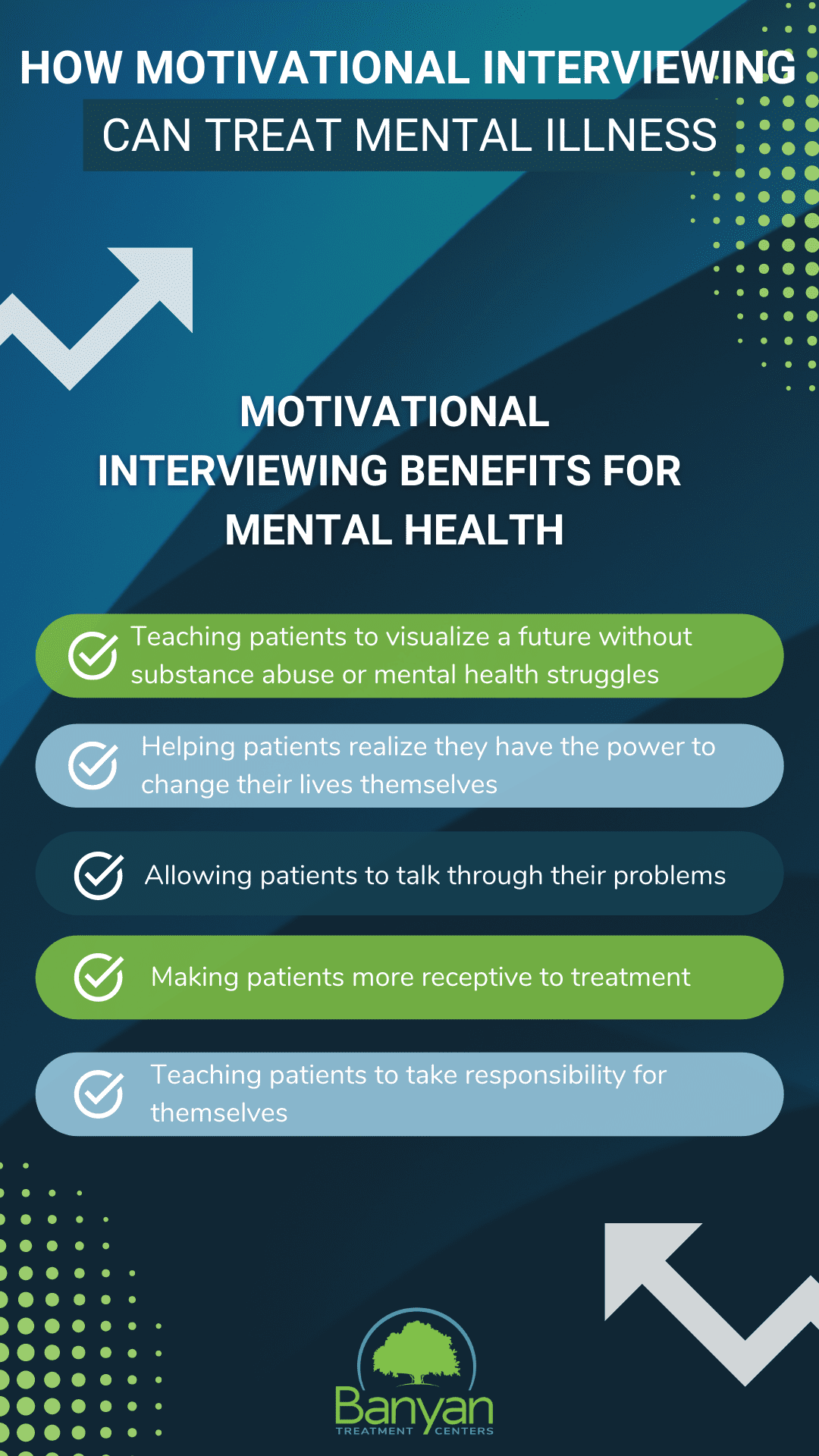
Symptoms of Co-Occurring Disorders
June 1, 2018
Signs a Loved One Needs Help
June 1, 2018How Motivational Interviewing Can Treat Mental Illness

When it comes to mental illness, everyone requires their own treatment approach based on their needs and diagnosis.
Living with a mental health disorder can be challenging, but it is possible to live a normal lifestyle by learning how to manage your symptoms on a daily basis. Effective treatment for mental illness includes various therapies, and motivational interviewing is one of them. As a patient-driven and verbal therapy, there are many benefits of motivational interviewing for mental health. It helps to make the changes needed more attainable for the patient. As part of our mental health treatment therapies in Boca, we offer this therapy technique for people who are suffering from mental health issues such as depression and anxiety and need help managing their symptoms.
What is Motivational Interviewing?
Motivational interviewing is a therapy technique that empowers patients to make actionable behavioral changes in their lives through an interview-style discussion with a licensed mental health professional. This technique focuses on change talk where patients verbalize their need and desire to make changes in their lives.
Because the benefits of motivational interviewing for mental health are numerous, it has become a common treatment method for people struggling with various mental health problems and co-occurring disorders like substance abuse. This therapy technique identifies and accepts the fact that individuals who need to make changes in their lives approach counseling at different levels of readiness to change their behavior. In some cases, patients may have thought about making a behavior change but haven’t taken the necessary steps to make that change for themselves. During this fragile time, people may express a fear of change and deal with internal struggles that need to be broken down. This is where motivational interviewing comes in. A motivational interview allows individuals to learn how to effectively change unhealthy behaviors to aid the addiction recovery process.
Motivational Interviewing Benefits for Mental Health
There are many benefits of using motivational interviewing in the treatment of psychological problems and this approach has been proven successful for many patients. For these reasons, our mental health PHP in Pompano also uses motivational interviewing.
Some benefits of using motivational interviewing to treat mental illness include:
- Teaching patients to visualize a future without substance abuse or mental health struggles
- Helping patients realize they have the power to change their lives themselves
- Allowing patients to talk through their problems
- Making patients more receptive to treatment
- Helping patients discover the motivation to make necessary changes and the reasons why these changes are necessary
- Teaching patients to take responsibility for themselves
- Building the patient’s confidence and trust in themselves
Treatment outcomes are improved when there is a motivational spark for behavioral change. One study found that using motivational interviewing was 75% effective in the treatment of psychological diseases.1 Motivational interviewing used to treat depression specifically was found to result in a more favorable trajectory of the Patient Health Questionnaire-9 and a higher remission rate compared to standard management of depression.2
Because the benefits of motivational interviewing for mental health are so numerous and effective, therapists use this intervention technique to help motivate addicts to stop abusing drugs or alcohol, as well as help those struggling with a mental health illness to effectively manage their symptoms. If you are struggling with a mental illness, you may greatly benefit from this therapy technique at the forefront of your treatment plan. You will be able to move forward with a happy and healthy life in addiction recovery.
Initial Steps to Start Motivational Interviewing Therapy
1. Find a Qualified Counselor To begin motivational interviewing therapy, your first step should be to locate a counselor trained in this specific approach. You can ask your primary care physician for recommendations or use health directories to search for local or online professionals. Another way to find such a counselor is through your health insurance provider, which often has resources to help you identify suitable therapists in their network.
2. Verify with Your Health Insurance Before scheduling any sessions, it’s crucial to check your insurance coverage. Many insurance plans cover at least part of the cost of counseling, including motivational interviewing therapy. Knowing the specifics of your coverage can help you avoid unexpected expenses. Ensure that the counselor you choose is within your network to maximize your insurance benefits.
3. Prepare for the Initial Session The first counseling session typically involves a comprehensive assessment. This includes completing intake paperwork similar to what you would fill out at a medical appointment. Additionally, the counselor will ask about your goals, concerns, and overall priorities to tailor the therapy to your specific needs. Being prepared with this information can make the initial session more productive and set a clear direction for your therapy journey.
By following these steps, you can effectively start your journey with motivational interviewing therapy and work towards your desired changes.
What Are the Principles of Motivational Interviewing?
Express Empathy
One of the cornerstones of motivational interviewing is empathy. Therapeutic progress hinges on the client's comfort, which is often hampered by fear of judgment. Therefore, counselors strive to understand their clients' perspectives without casting judgment. This empathetic approach helps clients open up, fostering a safe and trusting environment where they can express their concerns and emotions freely.
Develop Discrepancy
Motivational interviewing also hinges on the concept of developing discrepancy. This principle helps clients recognize the gap between their current behaviors and their ultimate goals. Counselors assist in clarifying personal values and setting goals within a supportive, pressure-free space. This approach emphasizes the client's individual needs, desires, and strengths, helping them to see the contrast between where they are and where they want to be.
Roll With Resistance
Change is often fraught with resistance, a natural part of the behavioral change process that can involve conflicting desires and hesitations. Rather than confronting or opposing these resistances, counselors aim to explore and understand them. By reframing and presenting alternative interpretations, counselors help clients gain new insights into their behaviors and motivations. This non-confrontational method aligns change with the client's personal goals and values, gently encouraging them toward self-improvement.
Support Self-Efficacy
Finally, motivational interviewing emphasizes the importance of self-efficacy—confidence in one's ability to effect change. Counselors work to bolster their clients' belief in their own strengths and capabilities. They offer ongoing support and encouragement, recognizing and celebrating progress. Initially, a therapist might have more faith in the client's potential than the client themselves; however, with sustained support, clients begin to see their own power to achieve meaningful change.
Techniques Used in Motivational Interviewing
Motivational interviewing relies on a set of core techniques that help individuals explore their feelings and motivations effectively. Here are the essential methods:
Open-Ended Questions
Open-ended questions invite deeper thinking by not being answerable with a simple "yes" or "no." These questions often begin with terms like "how" or "what," encouraging clients to share more about their thoughts and experiences. Examples include:
- "How do you envision your future if you make this change?"
- "What strategies have you attempted previously?"
- "Can you describe your relationship with your family?"
Affirmations
Affirmations are statements that acknowledge a person's strengths and positive behaviors, boosting their confidence in their ability to change. Properly delivered affirmations can significantly enhance a person's self-belief. Examples might be:
- "You've shown remarkable resilience."
- "The way you managed that situation was impressive."
- "Thank you for coming today; it shows great courage to seek help."
Reflective Listening
Reflective listening involves listening carefully to a client's words and reflecting them back to confirm understanding. This technique reassures clients that their feelings and viewpoints are being heard and considered. It also offers an opportunity to clarify misunderstandings and invite further elaboration.
Summaries
Summaries are extended reflections that encapsulate the main points discussed, demonstrating close attention and understanding. They can be employed at different stages of a conversation. Examples include:
- Collecting: Aggregating key points to confirm comprehension. Example: "So, if I understand correctly, you're saying..."
- Linking: Connecting various elements of the discussion. Example: "Earlier, you mentioned... And now you're saying..."
- Transitioning: Helping to segue between topics or conclude a session. Example: "We've covered... What would you like to focus on next?"
By using these techniques, motivational interviewing facilitates a collaborative conversation aimed at encouraging individuals to find their own reasons for making positive changes.
Understanding "Roll with Resistance" in Motivational Interviewing
Rolling with resistance in motivational interviewing refers to a strategic approach counselors use to address a client's hesitation or ambivalence about change. Instead of confronting or criticizing, the counselor accepts the client's reluctance and helps them find their own path to change.
Key Principles:
-
Acceptance and Empathy:
- Recognize that resistance is a natural part of the change process.
- Validate the client's feelings and experiences without judgment.
-
Reframing:
- Offer alternative perspectives on the client’s situation.
- Encourage clients to view their behaviors and thoughts from a different angle.
-
Collaboration:
- Work together with the client to explore their goals and values.
- Focus on building a trusting relationship where the client feels understood.
Practical Examples:
-
Scenario Handling:
- If a client drinks to cope with stress, instead of blaming or confronting, the counselor might ask, "What other ways have you considered managing stress?" This opens up dialogue and empowers the client to think about healthier alternatives.
-
Alternative Interpretations:
- In a case where someone started drinking due to a partner's infidelity, the counselor might suggest, "It sounds like you felt hurt and betrayed. How might understanding your partner's actions as their failing rather than yours influence your response?" This helps shift the client’s perspective and reduce self-blame.
By rolling with resistance, counselors create a supportive environment where clients feel safe to explore their thoughts and motivations, ultimately leading to meaningful and self-driven change.
What is Reflective Listening and Why is it Important in Motivational Interviewing?
Reflective listening is a technique where the listener actively demonstrates that they are paying attention and attempting to grasp the speaker's perspective. This method involves mirroring the speaker's message to confirm understanding and provide the speaker with a chance to clarify or expand on their thoughts.
Key Components of Reflective Listening:
- Active Engagement: Demonstrating interest and understanding through body language and verbal cues.
- Mirroring: Paraphrasing the speaker’s words to confirm comprehension.
- Clarification: Asking follow-up questions to ensure the message is accurately received.
In motivational interviewing, reflective listening plays a pivotal role. Here's why it matters:
-
Building Trust: By showing that they are genuinely listening, therapists cultivate a trusting relationship with clients. This trust forms the foundation of effective therapeutic work.
-
Enhancing Empathy: Reflective listening allows therapists to convey empathy. This empathetic approach encourages clients to open up more freely and explore their true feelings.
-
Clarifying Thoughts and Emotions: It helps clients articulate their thoughts more clearly. When clients hear their own words reflected back to them, it can lead to deeper self-understanding and insight.
-
Correcting Misunderstandings: Since the therapist reiterates what the client has said, any misinterpretations can be promptly identified and corrected.
The Importance in Motivational Interviewing
Motivational interviewing fundamentally relies on the therapist's ability to empathetically understand and guide clients without judgment. Reflective listening achieves this by creating a collaborative environment where clients feel genuinely heard and understood. This can significantly enhance the effectiveness of the therapeutic process, leading to better outcomes for the client.
At Banyan Mental Health, we understand that mental health disorders can be debilitating, but you do not need to continue to struggle with a mental illness on your own. Our dual diagnosis treatment center in Boca Raton could be the answer to your problems. To learn more about our mental health care and how we can help you on your way to a full recovery, contact us today at 888-280-4763.
Sources:






